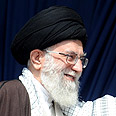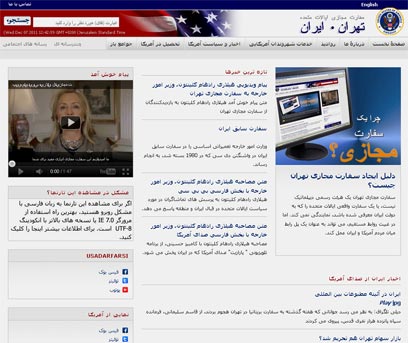
Web surfers and Iranian media reported that just hours after its launch, the site became inaccessible to web surfers within the Islamic Republic.
Related stories:
- US launches 'virtual' embassy for Iran 'Drone that crashed in Iran was on CIA mission'
- Expert: Cyber attack on Iran began in 2008
The site at: http://persian.iran.usembassy.gov/ went online Tuesday with versions in English and Farsi explaining why the administration has chosen a virtual diplomatic mission to further expand its effort to reach out to Iranians even as President Barack Obama's attempts to engage the government in Tehran over its nuclear program have yet to succeed.

The 'virtual embassy' site
However, Tehran was less enthusiastic about Washington's creative approach and expressed concerns that the site was meant to strengthen the US' "hostile" policies towards Iran.
An Iranian legislator claimed that the site was created in order to spy on Iran. Parliament speaker Ali Larijani said, "If the Americans think they can do something with this online embassy – they are mistaken."
Iranian parliament member Ismail Kouseri was pessimistic over the site's activities and claimed that it wouldn't be operational for more than a year.
"The Americans need to understand that this will increase criticism towards them and they will be forced to back down on the matter and close the site," Kouseri, a crony of the Iranian president, noted.
Parliament member Hossein Ebrahimi said that the site's purpose was "espionage" and contacting Iranian civilians. He warned that "Iran could take action in the cyber sector to deal with the site."
Relations between the two countries were severed over 30 years ago following the Islamic revolution in Iran in 1979 and the embassy hostage crisis - in which 52 Americans were held hostage by Islamist militants and students for 444 days from Nov. 1979 to Jan. 1981. Since that time the Swiss embassy has been representing Washington's interests in Tehran.
In spite of the block placed by Iranian authorities, some more computer savvy web surfers have managed to bypass the block and use proxy servers to view censored sites. These include Facebook, Twitter, YouTube and international news sites.
- Receive Ynetnews updates
directly to your desktop















